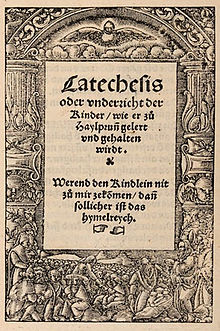Kaspar Gretter
Kaspar Gretter (later also Gräter ) (* around 1501 in Gundelsheim ; † April 21, 1557 in Stuttgart ) was a German theologian and reformer .
Life
Gretter was born in Gundelsheim am Neckar as the son of Jacob Gretter and probably attended school in Wimpfen . From 1520 he studied at the University of Heidelberg , where he passed the bachelor's degree in 1522, but then broke off his studies before obtaining the master's degree. Then he was briefly a schoolmaster at the Rheingrafen zu Morchingen im Waßgau and then came to the Reformation-minded Dietrich von Gemmingen († 1526) at Guttenberg Castle , where his father had already been in the service for thirteen years and where he taught preachers and others in Hebrew. After Dietrich's death, Gretter came to Johannes Brenz in Hall in 1526 .
Via letters of recommendation from the Dietrichs von Gemmingen brothers, Johannes Brenz and also from the Speyer court master Philipp von Helmstatt and an Erhart von Rossaw , Gretter became rector of the Heilbronn Latin School in 1527 . He held this office for six years. During this time he introduced Greek lessons in particular at the school and, together with Johann Lachmann, promoted the Reformation in Heilbronn by completing the Heilbronn Catechism of 1528 that Lachmann had begun . In 1530 another work by Gretter appeared in Nuremberg, in 1531 he published three psalms and a church prayer in Ettlingen, in 1532 he was the Latin translator of a Brenz work on matrimonial matters.
In 1533 he left Heilbronn, where he married Anna Zehe († 1541) around 1527 to study theology in Heidelberg. After his master's degree on February 10, 1534, he accepted the parish office in Herrenberg in the autumn of the same year , where he carried out the Reformation and published another catechism based on Martin Luther and Johannes Brenz . In September 1537 he was called to Urach for Götzentag , where the abolition of picture decorations in churches was discussed and where Gretter took a mediating position. Shortly afterwards Gretter came to Cannstatt , where he was pastor and deacon. From 1540 he was court preacher to Duke Ulrich in Stuttgart , but had to flee the city in 1542 after a controversial sermon.
He found temporary asylum with his old employers, the Lords of Gemmingen , at Guttenberg Castle and received several new job offers, but was then able to return to Stuttgart, where Georg von Ow intervened, where his position at Duke Ulrich's court was consolidated. After Ulrich's death in 1550, Gretter remained court preacher under his successor, Christoph , even when the court was relocated to Tübingen from 1551 to 1553 because of the new palace . During this time Gretter was the editor of another Brenz catechism and also one of the three spiritual councilors of the Württemberg upper church authorities. After the death of his first wife, Gretter married again and died of a stroke on April 21, 1557 in Stuttgart.
Selection of works
(For a complete overview of his surviving works, see the directory of the 16th century prints published in the German-speaking area )
- Catechesis, or training for children, as taught and held at Haylbrunn. 1528
- That the Christian faith is one, just and helpful. Nuremberg 1530.
literature
- Heinrich Fausel: Gräter, Kaspar. In: New German Biography (NDB). Volume 6, Duncker & Humblot, Berlin 1964, ISBN 3-428-00187-7 , p. 717 ( digitized version ).
- Julius Hartmann: Gräter, Kaspar . In: Allgemeine Deutsche Biographie (ADB). Volume 9, Duncker & Humblot, Leipzig 1879, p. 599 f.
- G. Bossert: Gräter, Kaspar . In: Realencyklopadie for Protestant Theology and Church (RE). 3. Edition. Volume 7, Hinrichs, Leipzig 1899, pp. 58-60.
- Friedrich Wilhelm Bautz : Kaspar Gretter. In: Biographisch-Bibliographisches Kirchenlexikon (BBKL). Volume 2, Bautz, Hamm 1990, ISBN 3-88309-032-8 , Sp. 281.
- Th. Pressel: Anecdota Brentiana . Tübingen 1868, p. 434
- F. Cohrs: The evangelical attempts at catechism before Luther's Enchiridion 2 , Leipzig 1900, p. 313
- M. Reu: Sources on the history of catechism teaching 1 . Gütersloh 1904, pp. 290 and 314
- Karl Figge: Kaspar Gretter 1527-1533 . In: 350 years of high school in Heilbronn. Festschrift for the anniversary of the Theodor-Heuss-Gymnasium . Heilbronn City Archives, Heilbronn 1971 (Publications of the Heilbronn City Archives, 17)
| personal data | |
|---|---|
| SURNAME | Gretter, Kaspar |
| ALTERNATIVE NAMES | Greber, Kaspar; Greter, Kaspar |
| BRIEF DESCRIPTION | Lutheran theologian and reformer |
| DATE OF BIRTH | around 1501 |
| PLACE OF BIRTH | Gundelsheim |
| DATE OF DEATH | April 21, 1557 |
| Place of death | Stuttgart |
